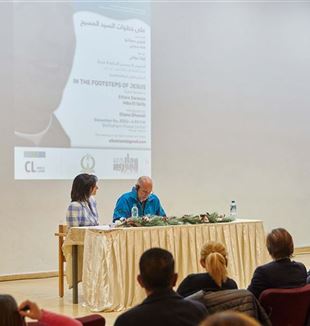
In Bethlehem, in the footsteps of Christ
In the city of the Basilica of the Nativity, an event to celebrate the centenary of Fr. Giussani. Hiba's testimony, the presentation of Luigi Amicone’s book, and the message of the Patriarch of Jerusalem.Bethlehem's Manger Square has a special charm at sunset in Advent. The lights of the large Christmas tree lit in early December reflect off the white stone of the Basilica. A few meters away, its doors are always open to the Peace Center of the Municipality, which hosts numerous Christmas initiatives. This year, among the many events planned, was a meeting to discover Fr. Luigi Giussani, on the occasion of the centenary of his birth. Images of his only trip to the Holy Land welcomed guests into the packed hall, to the song Nazareth morning. "Nazareth morning, Bethlehem star, a light for people near and far. Dawn grows to Day, Day comes to stay. The dark of sin won’t dim the way."
Hiba Al-Saadi told us what this dawn of hope means, which is to be begged for every morning, especially by those who live on the bumpy road of permanent conflict. A 38-year-old mother of three, she is a social worker at Baby Caritas Hospital, a Catholic hospital in Bethlehem, the only pediatric hospital in the Palestinian Territories. Hiba recounted the story of a friendship, born amid the hospital wards, with a strange group of Italians. They were happy people, more interested in people than their charitable works. Twelve years later, they were there to listen to Hiba: Enrico, Tiziana and the many others involved in this special story of friendship.
"I want to thank my husband, Reed, and my family because they allowed me to spend time with these friends," Hiba said "Reed always encouraged me to attend their meetings because he could see that I would go home happy. He understood that it was something that nourished my soul, that made me live the most joyful moments with more intensity, as well as the most difficult ones. I slowly discovered that Fr. Giussani was at the origin of the joyfulness of those friends. A priest who did not live locked up in a church, but went out and knew how to touch the hearts of young people. Just as the Pope told us in the audience for Fr. Giussani's centenary." The Audience in St. Peter's Square on October 15 is precisely what awakened the desire of the small community in the Holy Land to propose this encounter that changed their lives to their city, inviting authorities, colleagues and friends to meet Fr. Giussani.
Greetings from the Governor of the Bethlehem area and the city's deputy mayor were followed by the reading of a message from the Patriarch of Jerusalem: "I knew Fr. Giussani indirectly, I have always been struck by his freedom, not to be taken for granted today, to make every human action and initiative descend directly from his relationship with Christ and to direct himself to Him," wrote Monsignor Pizzaballa. "For a believer it may be an established fact, and yet it is so rare to hear it: deciding to be for Christ necessarily leads one to bet on the person, to love them unconditionally, because the criterion and measure of such love are those of Christ Himself." In a context like the Holy Land, where social, health and educational works are the strength of the Christian presence, it is even more urgent not to lose awareness of Who is at their origin.
"The much-desired renewal of our activities must not start from the renewal of structures," the Patriarch concluded, "but from returning to Jesus' question to the disciples: Who do you say that I am? A question that Fr. Gius was able to answer so clearly and that continues to disturb and fascinate so many after him to this day."
Like Ettore Soranzo, who arrived in the Holy Land 25 years ago to serve first in a Catholic hospital in Nazareth, and then the Custody of the Holy Land in Jerusalem until 2018. In a group photo from the 1986 pilgrimage – recounted by Luigi Amicone in his book Sulle trace di Cristo [In the footsteps of Christ], which Ettore presented during the meeting - Fr. Giussani is seen kneeling at the feet of a Franciscan friar. "I think that nothing better expresses the passion this man had for serving the Church, a passion that I was able to experience in person, since I had the good fortune to be able to serve three great works of the Church precisely thanks to him," Ettore recounted. "He had so much love for Jesus, and therefore for his Church, that every time the Church asked for help, for collaboration, he tried to do everything to be able to say yes. Thus, a history of service was born in this local church as well, which includes, for example, the volunteers of the Gelmini Association, where the focus is not so much the realization of concrete works or cooperation projects, but the growth of one’s own faith, of friendship , and companionship with those who live here through experiences of work and community."
Read also - The prophecy of peace in Times Square
It is a story that was born from "nothing," that is, of small, discreet gestures that the world does not notice, but that follow God's method, which had such an impact on Fr. Giussani in Nazareth. "The most impressive thing," he reflected after praying in the grotto of the Annunciation and the grotto of the Nativity, "is that everything was born from those holes, from absolute poverty. It is impressive because, by its nature, Christianity begins like that, always."#100Initiatives